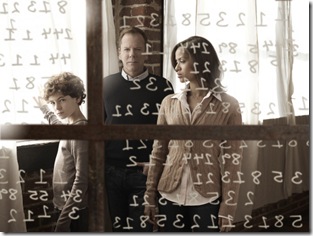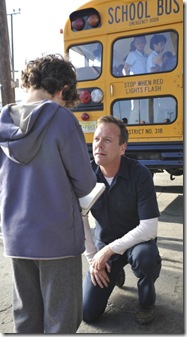Tim Kring’s new series, Touch, marks Kiefer Sutherland’s return to primetime television. In it, he plays Martin Bohm, single parent to Jake – a remarkable ten-year old boy who has been misdiagnosed as autistic, but is something… more.
Touch opens with a voiceover, by Jake Bohm [David Mazouz], that informs us of a mathematical constant in which is contained that which might be seen as chaos but is much more. As he speaks, we see flashes of various people – an intense, dark-haired man; a Japanese girl; a man in horn-rimmed glasses; a woman in the rain and more, concluding with a man who accidentally drops his phone in an airport – before cutting to a shot spiraling back from a number sequence to reveal Jake, writing numbers in a notebook. He is ten years, five months, seventeen and fourteen – and in that time he’s never said a single word.
We cut to Martin Bohm [Kiefer Sutherland], Jake’s father – a single parent [his wife died in the 9/11 attack], picking up a box of cell phones from the lost and found at JFK International Airport – his son likes to take them apart – when one of them rings. It’s the man we saw during Jake’s voiceover. He needs the phone – or, at least, a picture of his daughter that’s on it.
Martin is interrupted by a phone call about his son. Distracted and in a hurry, he forgets the lost phone which then goes around the world – gathering photos and videos and people find it, record stuff and send it on its way again. Martin, on the other hand, drives to a local cell phone tower where Jake is sitting a hundred feet up, writing in his notebook. It’s the third day in a row that he’s done this, and always at 3:18.
The incident brings social worker Clea Hopkins [Gugu Mbatha-Raw into Martin’s life as he faces the possibility that Jake might be taken away from him – a possibility that leads him to a Professor Arthur Teller [Danny Glover], whom we also saw in the opening sequence. He explains that Jake is not autistic, but rather, more evolved and his numbers may be able to predict the future.
Suddenly, things begin to make a weird kind of sense to Martin – and to us. Events happening around the world – from an Iraqi youth trying to steal an oven to replace the broken one in to his family’s restaurant to a Japanese comfort girl persuading a friend to play videos from the globetrotting phone on a giant screen in downtown Tokyo [one of which features an Irish lass whom we met earlier] – fit into a bigger picture. One in which a lottery player and a school bus figure in an unexpected way – a kind of mathematical butterfly effect that changes the course of events for people of varying ages and backgrounds.
Series creator Tim Kring has taken some basic facts – like the ratio that is reflected in so many ways throughout the universe – and mixed in a bit of science and a hint of the supernatural to create a unique series idea that plays with tropes from a number of television genres [from procedurals to thrillers and beyond] in a way that feels fresh.
Sure there are bits that seem a bit much [social workers don’t have the power to decide, on their own, to remove a child from a parent’s custody, let alone spend that much time on any one case – there’s a procedure to followed; Martin had a high-paying job as a reporter before he quit to look after his son – he must have been one heckuva reporter!], but overall, the concept is sound and intriguing.
Director Francis Lawrence blends all of the premiere’s disparate parts well via cinematography that utilizes camera phones, film and digital video and some pretty spiffy editing. He lets the events speak for themselves, keeping the pace somewhere between deliberate and up tempo. The result is good old-fashioned suspense.
Sutherland is appropriately all over the map as he tries to balance his job and looking after Jake, going from calm through frustration to anxiety and exasperation at just the right levels, at just the right time. Considering that Jake doesn’t speak – and can’t stand being touched –Sutherland and Mazouz have extremely good chemistry. Mazouz also does a terrific job of making Jake feel ‘other’ while never making him unsympathetic, or too alien.
Mbatha-Raw somehow manages to not make Celia the villain here. Instead, she radiates sympathy and growing understanding of Martin’s predicament and Jake’s uniqueness. Glover doesn’t have much screen time but he provides crucial exposition without becoming the black Basil Exposition – quite a feat!
Guest star Titus Welliver comes out of the gate looking to be a bit on the nasty side, but as we learn about his background and see what he does, we realize that not only is no one the villain in their own story, the guy who seems to be a villain might be something else entirely.
Touch reminds me of Lost, the first season of Heroes and 24 insofar as they all required an audience to pay attention – and, given the concept of the show, it always plays fair. Whatever happens onscreen, it has consequences and therefore none of the characters is inconsequential. Sure there are some flaws, but the enthusiasm of the cast and the coolness of the series concept make them easier to live with.
What matters is that Touch is fresh and ambitious and entertaining.
Final Grade: B+
Photos by Brian Bowen Smith and Richard Foreman/courtesy of Fox Television

